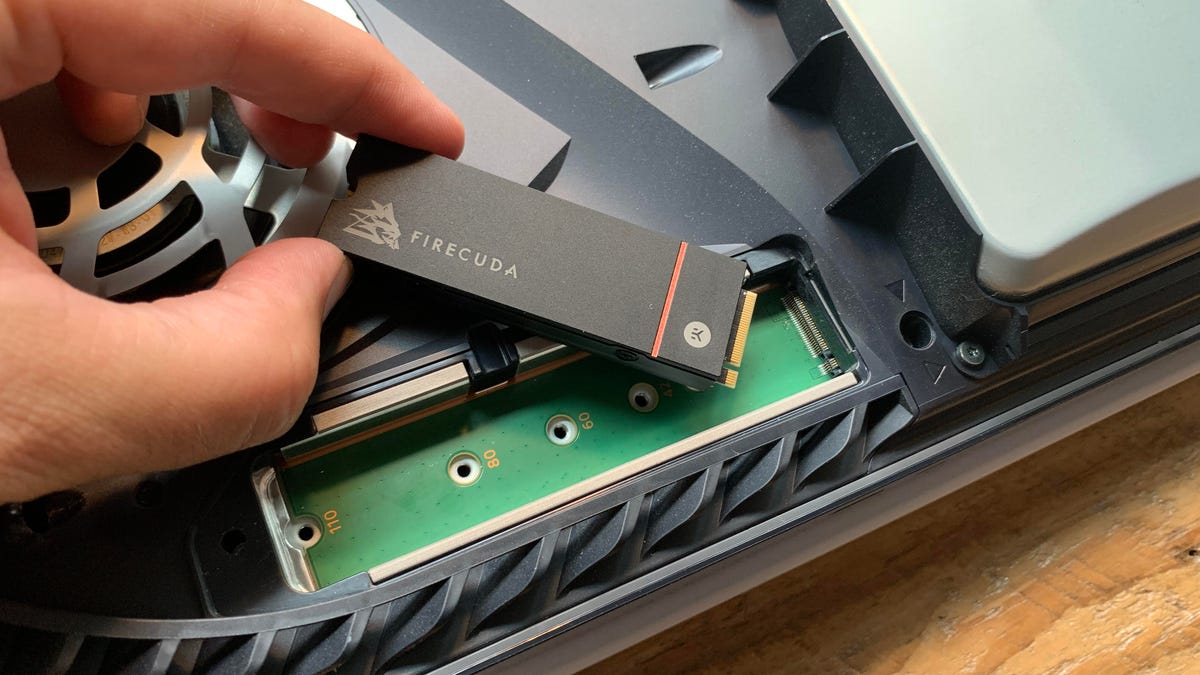 Why You Can Trust CNET
Why You Can Trust CNET PS5 M.2 storage drives tested: Samsung vs. Seagate vs. Corsair
It's easy to add extra storage to your PlayStation 5, but does it matter which drive you use?

The Seagate FireCuda 530.
The PlayStation 5 game console may come with a sizable 825GB of storage, more than most computers, but it's still not enough. After system files, you've got less than 700GB of free space for games and those games average around 25GB, but can go past 100GB in size.
But there's good news. After a few OS updates, your PS5's second internal hard drive slot, which was initially deactivated when the PS5 was first released, is now available for use. That means you can use a sold-separately M.2 drive (a type of solid state storage drive) to store and play both PS5 and PS4 games from.
The Corsair MP600 Pro LPX.
Read more: PS5 review: Exclusive games power Sony's sky-high space-age console
Much like the PS5 itself, or desktop graphics cards, some phones and even new cars, pandemic supply chain issues have made these M.2 solid state drives hard to find, especially in the most popular console-ready sizes. That appears to be easing now, and two of the three drives we've tested are available right now (the Corsair, a new model, doesn't appear to be in stock yet).
We've gathered advice on some of the best M.2 drives for your PS5 in our guide. But if your preferred model is unavailable, how much of a difference does it make if you buy something else?
The Samsung 980 Pro.
To figure this out, my colleagues and I tested three M.2 drives specially marketed as being PS5-ready. We tested the Seagate Firecuda 530, the Samsung 980 Pro and the Corsair MP600 Pro LPX, all of which included a built-in heat sink. Prices on these jump around a good deal, but the 2TB version of each currently runs between $350-$400.
For each drive, we took a game with a smaller file size and a game with a larger file size and timed how long it took for the PS5 to transfer the game files between the internal PS5 drive and the new M.2 secondary drive, and also how long it took for the files to make a return trip from the M.2 drive to the internal drive. It's a casual test, but works as a general guide for comparing these very similar drives.
PS5 M.2 file transfer time (in min:sec)
| Console to M.2 | M.2 to console | |
|---|---|---|
| Final Fantasy VII Remake (81GB) | ||
| Seagate FireCuda 530 (4TB) | 1:05 | 6:00 |
| Samsung 980 Pro (1TB) | 1:08 | 5:56 |
| Corsair MP600 Pro LPX (2TB) | 1:04 | 5:54 |
| Spider-Man: Miles Morales (39GB) | ||
| Seagate FireCuda 530 | 0:33 | 2:57 |
| Samsung 980 Pro | 0:31 | 2:53 |
| Corsair MP600 Pro LPX | 0:33 | 2:54 |
Read more: Best M.2 SSD for expanding PS5 storage
In all three cases, transferring from the internal drive to the new M.2 drive was faster than the reverse, writing back to the internal drive. Note the internal drive has a read/write speed of 5,500MBps, while the Seagate Firecuda is listed as 7,300MBps. The Samsung is listed at up to 7,000MBps read/write, and the Corsair at 7,100MBps read and 6,800MBps write.
Based on this, it's fine to shop based on availability, price and capacity. With it becoming glaringly obvious that today's consoles just don't ship with enough storage space, you're going to need extra capacity sooner or later.

